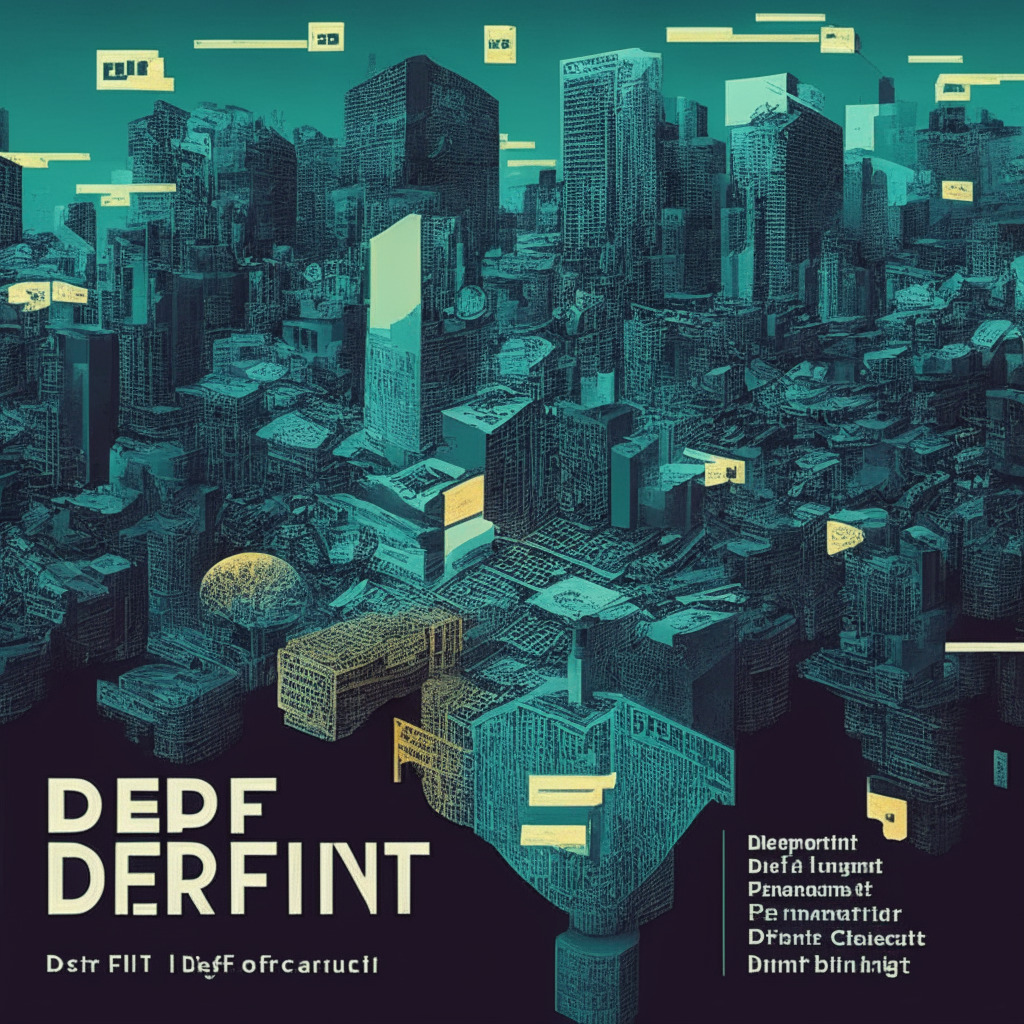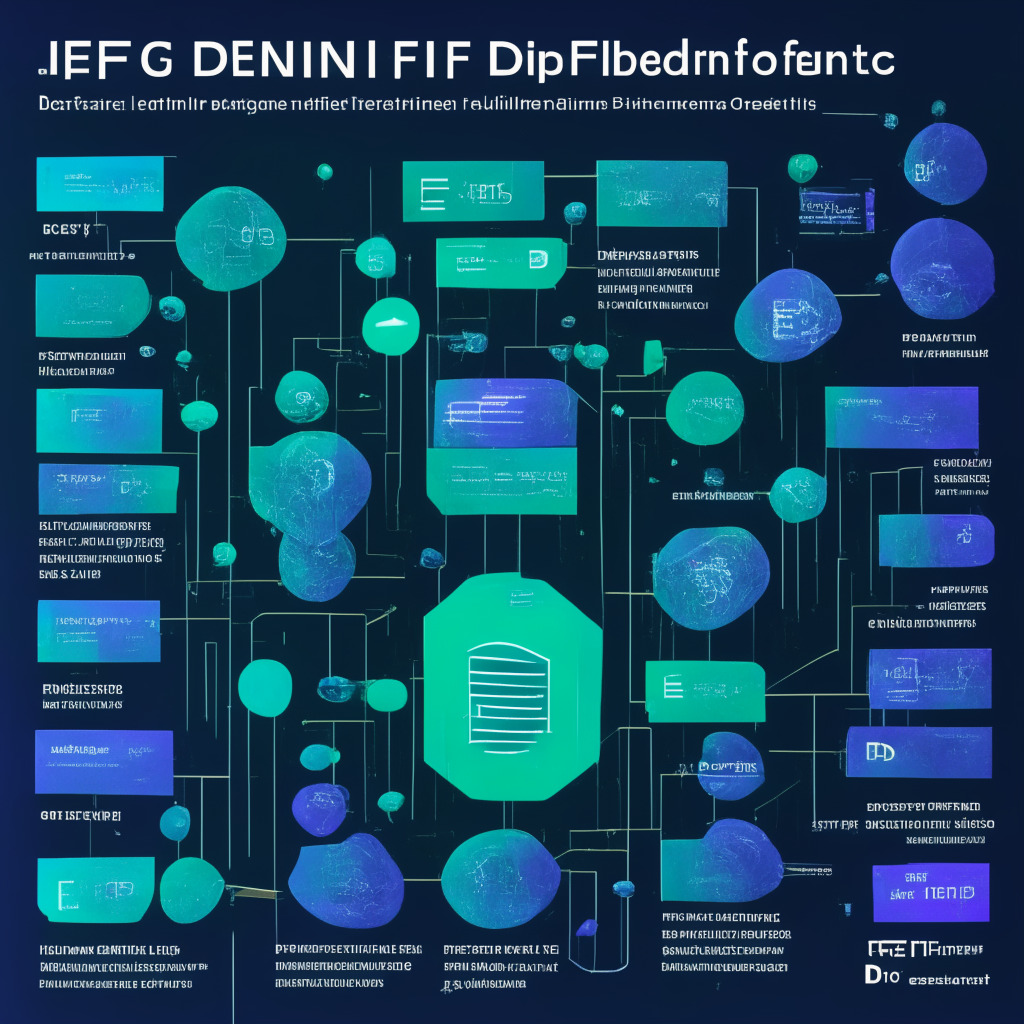The recent $1.2 million fine imposed on bitFlyer USA by the NYDFS raises questions about the balance between regulatory oversight and the decentralized nature of cryptocurrencies, highlighting the importance of cybersecurity and the potential impact of regulations on innovation and growth within the crypto industry.
Month: May 2023
Crypto Market Rollercoaster: CAKE, AGIX, and HBAR Struggle Amidst Uncertainty and Changes
In April 2023, the crypto market experienced mixed performance with major altcoins recording losses. Factors behind these losses include changes in reward systems, market consolidation, and profit-booking. Investors should remain vigilant, conduct thorough research, and monitor market changes to make informed decisions.
Bitcoin Miners’ $50 Billion Profit: Analyzing Network Challenges & Future Viability
Bitcoin miners have earned over $50 billion from fees and block rewards since 2010, with a long-term profit margin of 37%. Despite concerns about mining costs and price fluctuations, network fundamentals remain strong, though increasing transaction fees may warrant caution in the industry.
Russian Bank Profits Soar in 2023: Breaking Records or Facing Sanctions Impact?
The Central Bank of Russia forecasts potential record-breaking profits for Russian banks in 2023, despite the 2022 challenges from unprecedented sanctions. This optimism follows a record quarterly profit of 881 billion rubles in Q1 2023, encouraging updated predictions from the National Credit Ratings agency. However, caution is advised due to ongoing impact from sanctions, economic conditions, and geopolitical events.
French Senate’s Shift on Crypto Influencer Ads: Balancing Growth with Consumer Protection
The French Senate’s Economics Committee approves a proposal allowing social media influencers to promote registered cryptocurrency companies’ products, contrasting the National Assembly’s previous ban. The amendment aligns with France’s Consumer Code and signals a shift in attitude towards the crypto industry while stirring debate on balancing promotion and consumer protection.
AI’s Rising Role in Crypto: Opportunities, Challenges, and Finding Balance
Crypto.com introduces “Amy,” an AI companion providing users with real-time token prices, project updates, and industry insights. As the crypto community becomes increasingly intertwined with AI, leveraging this technology promises improved user experience, better decision-making, and enhanced efficiency, while also addressing potential risks and challenges.
NFT Surge on Bitcoin Blockchain: Democratizing Art or Fleeting Trend? Pros and Cons Explored
The Bitcoin blockchain experienced a surge in non-fungible tokens (NFTs) as inscriptions rose above 3 million, primarily comprising text-based assets using the Ordinals Protocol. This spike coincided with the introduction of the Bitcoin Request for Comment (BRC-20) token standard, enabling transferable tokens, digital artwork, and meme tokens on the network.
UK’s Battle Against Crypto Fraud: Striking the Balance Between Regulation and Innovation
The UK government is cracking down on financial fraud, including cryptocurrency schemes, amidst a surge in crime costing £7 billion annually. Proposed measures include the Economic Crime and Corporate Transparency Bill, empowering law enforcement to seize illicitly-used crypto assets, and potentially banning cold calls marketing financial products. Policymaker’s challenge lies in protecting investors while nurturing a compliant, innovative digital asset market.
Offshore Crypto Derivative Platforms: Exploring Gemini Foundation’s Global Reach & Exclusion of Key Markets
Gemini Foundation, an offshore crypto derivatives platform, is now available in 30 countries, excluding the US, UK, and EU. Catering to the demand for crypto derivatives trading, this platform offers a capital-efficient and trusted venue. Regulatory uncertainty and stringent attitudes from authorities like the SEC have driven crypto exchanges to offshore locations.
Bitcoin’s Struggle for $29k: How Interest Rates Affect Crypto Markets and Altcoin Stability
Bitcoin attempted to reach the $29,000 mark but was halted, while altcoins exhibited minimal volatility. Despite recent fluctuations, Bitcoin’s market cap remains at 47% dominance over altcoins. Investors should stay vigilant and be prepared for more market volatility due to potential interest rate changes by the US Federal Reserve.
Banking Crisis vs Digital Assets: The Financial Revolution Beckons
Amidst financial chaos in the banking industry, digital assets and decentralized finance (DeFi) emerge as beacons of hope, offering opportunities for a new financial system focusing on access, inclusivity, and self-autonomy, potentially revolutionizing traditional banking with blockchain technology.
Coinbase’s Bermuda Expansion: Dodging Regulators or Risky Move? Pros, Cons & Market Impacts
Coinbase launches a derivatives exchange in Bermuda amidst regulatory challenges, while Hong Kong-based BIT Mining Ltd. rolls out the LD4 Dogecoin and Litecoin mining machine. Crypto market fluctuations and meme-based tokens’ sustainability remain hot topics as the industry faces mixed growth signals.
Bitcoin’s Fate Amid Federal Reserve Decisions: Who Holds the Cards?
Bitcoin’s value surges 70% this year, with the Federal Reserve’s interest rate decision playing a significant role. As Jerome Powell’s announcement approaches, his clarity on the end of the tightening cycle may impact Bitcoin’s price, as Treasury yields and the U.S. dollar historically affect the cryptocurrency’s performance.
Bhutan’s Bold Crypto Venture: Eco-Friendly Mining Meets Economic Growth & Sustainability Debate
Bitdeer Technologies Group and Bhutan’s Druk Holding and Investments (DHI) collaborate to create eco-friendly, carbon-free digital asset mining operations in Bhutan, establishing a $500 million closed-end fund to attract global investments, and potentially transforming the Kingdom’s tech sector, while raising sustainability and transparency concerns.
UK’s Battle Against Fraud: Impact on Crypto Market and Striking the Innovation-Security Balance
The UK government plans to stop cold calls selling financial products, including insurance and cryptocurrencies, to tackle £7 billion in annual fraud costs. By collaborating with The Office of Communications (Ofcom), the focus is on countering phone number “spoofing,” while balancing security and fostering innovation within the crypto industry.
Bhutan’s Crypto Mining Boom: Balancing Economic Growth and Environmental Sustainability
Bhutan plans to create a $500 million fund for cryptocurrency mining, leveraging its abundant hydroelectric power reserves. The government aims to attract local and foreign investments by offering incentives like tax exemptions and simplified crypto mining regulations, while ensuring eco-friendly operations and sustainable development.
Coinbase Stock Plunge: Growing Crypto Doubts or Temporary Market Correction?
Following regulatory actions, Coinbase’s stock nosedived 28.6% over three weeks, reflecting growing doubts in the crypto world. Citi Group downgraded Coinbase shares due to uncertain regulations while the SEC issued a Wells notice, further impacting the stock. Coinbase now seeks regulatory clarity through legal action, while facing accusations of insider trading.
Pepe Token Frenzy: Real Demand or Bots and Quick Profits Driving the Market?
Pepe token (PEPE) surpasses dogecoin and shiba inu in trading volumes, reaching over $250 million. However, concerns arise regarding the influence of bots and quick profits made by early investors, questioning pepe’s long-term viability in the crypto market.
US Debt Default: A Catalyst for Bitcoin’s Surge or Global Economic Fallout?
Geoff Kendrick, head of forex research at Standard Chartered, believes that a US debt default could trigger a massive surge in Bitcoin’s value by $20,000. Cryptocurrency enthusiasts argue that Bitcoin’s deflationary nature and decentralized attributes position it as a safe haven during uncertain market conditions. However, the broader impact of a US default on the cryptocurrency market continues to be debated.
Metacade’s MEXC Listing and Future in Blockchain Gaming: Pros, Cons, and Conflict
Metacade, a play-to-earn GameFi platform, is gaining attention in the crypto community with its upcoming listing on MEXC Exchange. Aiming to become the premier platform for gaming in the metaverse, Metacade received a perfect score on DEX Tools, showcasing its trustworthiness and security. However, investors should exercise caution and research before investing in emerging blockchain projects.
Nolus DeFi Lease: Revolutionizing Money Markets with $2.5M Funding, Interoperability & LSDs
The Nolus DeFi Lease aims to address inefficiencies in DeFi money markets, securing $2.5 million in pre-seed and seed funding. Offering up to 150% financing and lowering margin call risks, Nolus enhances lending options and widens access to leveraged assets.
TON Foundation Boosts Security with Chainalysis Partnership: Pros, Cons & Main Conflict
The TON Foundation has partnered with Chainalysis to enhance security using its Crypto Incident Response Service, ensuring swift fund recovery in case of hacks or exploits. This collaboration aids TON’s aim to unite all blockchains and Web2 using its technology while providing robust means to combat cyber-attacks and unauthorized network intrusions involving cryptocurrency theft or ransom demands.
Cryptocurrency Lawsuit Served via Twitter: Legal Innovation or Privacy Intrusion?
In a groundbreaking move, a US court granted permission to serve a lawsuit through a tweet to cryptocurrency YouTuber Tom Nash, raising questions about the legal implications of using social media in legal proceedings. This highlights the complexities of combining law and digital communication, while underscoring potential negative implications on individual rights and privacy.
Metacade’s MEXC Exchange Listing: Boon or Bane for GameFi Investors?
Metacade, a play-to-earn GameFi platform, announces its listing on MEXC Exchange, potentially solidifying its market position. With a perfect score on DEX Tools and upcoming Metacade Lite release, the platform shows promise. However, crypto volatility and growing competition present challenges for its long-term success.
Balancing Blockchain Innovation and Regulation: Pros, Cons, and Finding the Sweet Spot
This article discusses the debate surrounding regulations in the blockchain industry, particularly the balance between ensuring safety and law enforcement while preserving innovation, independence, and anonymity. Highlighting recent cases involving the FBI, the piece emphasizes the challenge in finding an optimal balance for the industry’s growth, innovation, and security.
Fines and Innovation: Striking a Balance in Crypto Exchange Regulations
The New York State Department of Financial Services (NYDFS) fined bitFlyer USA $1.2 million for failing to comply with cybersecurity requirements, raising concerns about the effectiveness of licensing processes for crypto firms. While fines may improve security and regulatory compliance, striking a balance between enforcement and fostering innovation is crucial for the blockchain sector’s sustainable growth.
Bank Failures: Unraveling the US Banking Sector and Impact on Global Economy
The recent collapse of First Republic Bank, the second-largest bank failure in US history, raises concerns about potential economic repercussions and systemic weaknesses within the US banking sector. Critics argue that the US Federal Reserve’s hawkish policies, including interest rate hikes, contributed to these failures, sparking discussions about the delicate balance governments and central banks must maintain between inflation control and a stable financial sector.
AI-Generated Imagery in Human Rights Campaigns: Ethical Dilemma or Innovative Approach?
Amnesty International utilized AI-generated images to publicize police brutality in Colombia, sparking debate on ethical implications. Critics argue that the use of AI-generated images undermines trust in the media and fuels suspicion in a polarized era of fake news. Balancing AI potential and ethical considerations is crucial for maintaining trust and fostering societal progress.
Cryptocurrency Exchange Transparency: Ensuring Trust and Security in the Age of DeFi
The recent crash of FTX, a popular cryptocurrency exchange, highlights the importance of transparency and security in centralized exchanges (CEXs). To ensure asset safety, traders should consider factors such as regular audits, open communication, key metrics, security measures, and platform history and reputation when selecting a CEX.
Bankrupt Crypto Lender Celsius’ Struggles: A Tale of Regulation, Oversight, and the Future
This article highlights the importance of proper regulation and oversight in the cryptocurrency market, using the case of bankrupt crypto lender Celsius and its alleged poor record-keeping as an example. The ongoing conflict underscores the need for a balanced approach embracing necessary regulations while allowing for innovation and growth in the crypto sphere.
Crypto Lender’s Sham Merger: Impact on Creditors and Lessons for the Blockchain Future
Defunct crypto lender Celsius Network faces controversy over merging its UK and US entities, with allegations that the distinction is a “sham.” The situation raises concerns about fraudulent activity, transparency, and the impact on the broader crypto market. The upcoming auction for Celsius’ remaining assets may offer customers a chance to recover investments.
Debt Default Fears & De-Dollarization: Russia’s Stance on the Shaky US Economy
Russia closely monitors the US economy amid debt default concerns and warnings by Treasury Secretary Janet Yellen. The ongoing crisis highlights economic system weaknesses, prompting countries like Russia to explore alternate solutions such as de-dollarization efforts and a potential common BRICS currency.































